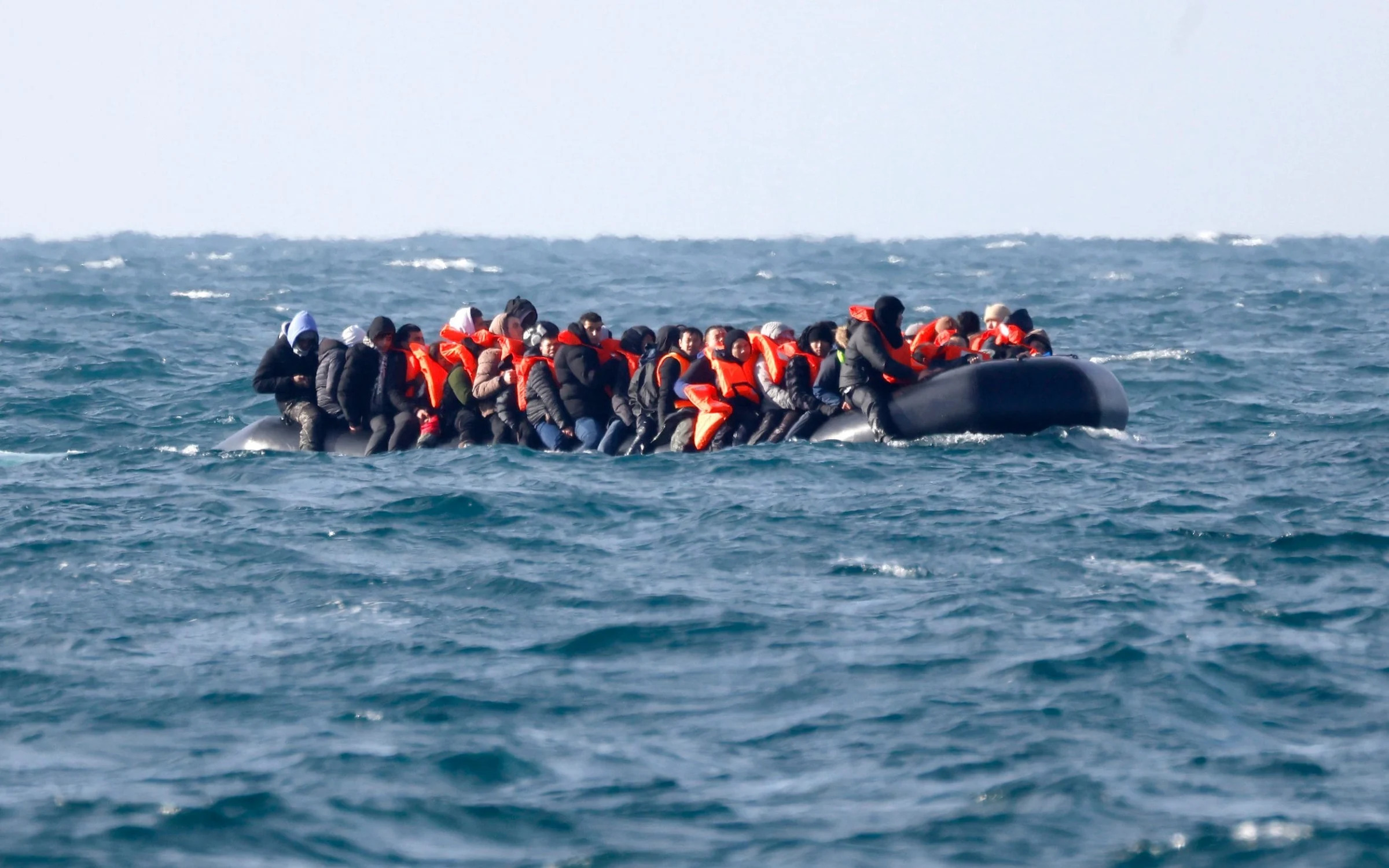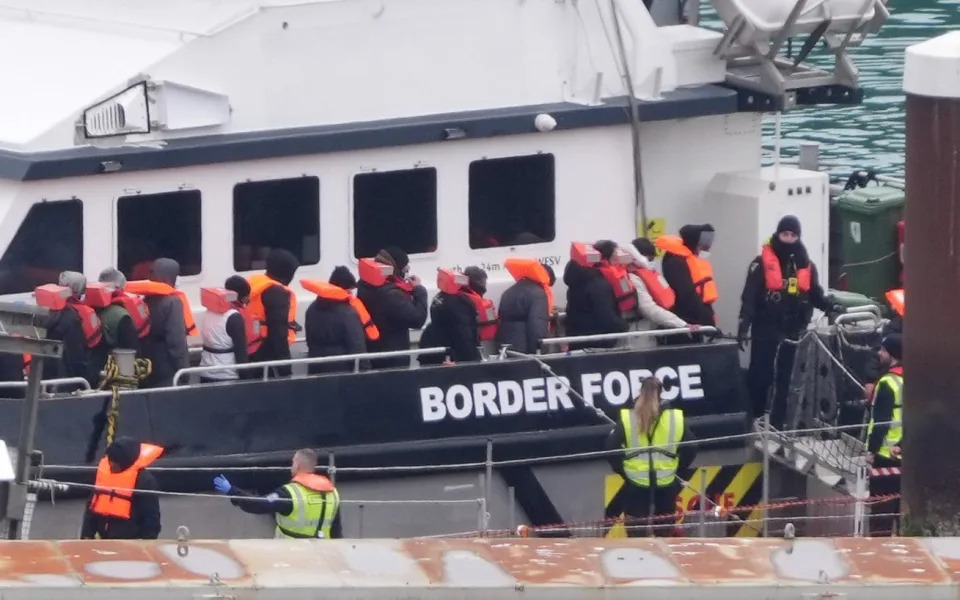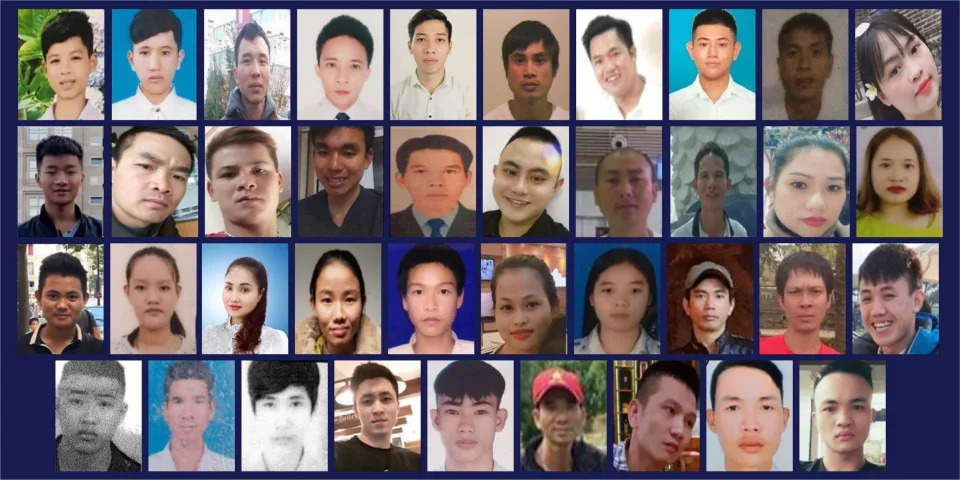More Channel migrants have come from Vietnam this year than any other country as the Government urged the Lords to drop its opposition to the Rwanda Bill.
The surge in Vietnamese migrants has been blamed by Downing Street for contributing to the record numbers crossing this year. Some 534 people reached the UK on Sunday, the highest in a single day this year. It brought the total this year to 6,265, up 28 per cent on the same point last year and seven per cent up on 2022.

Sunday saw the highest number of migrants reaching the UK in a single day, with 534 people -
On Monday, the Prime Minister’s official spokesman cited the “increasing number of Vietnamese” as one reason why the Safety of Rwanda Bill needed to be passed by Parliament to “save the lives of those being exploited by people-smuggling gangs”.
“It’s an unacceptable number of people who continue to cross the Channel and that demonstrates exactly why we must pass this Bill and get flights off the ground as soon as possible and provide the important deterrent that the Bill will provide,” he said.
On Monday night, MPs rejected Lords’ seven changes to the Bill by majorities of between 59 and 74 votes.
That sent the legislation back to the Upper House where Labour and crossbench peers will mount a fresh attempt on Tuesday to defeat the Government and send the legislation back to the Commons in a further round of parliamentary “ping pong”.

The number of Vietnamese crossing the Channel more than doubled last year from 505 in 2022 to 1,323. The rise has continued this year to make them the biggest cohort of Channel migrants, with Border Force reporting small boats packed with up to 20 Vietnamese migrants
Tougher security on lorries and the deaths of 39 Vietnamese migrants in a lorry trailer in Essex in 2019 has seen them divert away from road routes to small boats.
Vietnamese migrants tend to be trafficked by gangs into nail bars, cannabis farms, restaurants and the sex trade in the UK, which is why crime bosses have preferred lorries rather than small boats, where migrants are likely to be detained by Border Force.
Some have entered Europe via Serbia or Romania on work visas, only to find jobs badly paid with poor conditions.

“Many then travel onwards through Europe, again under the false premise of better conditions elsewhere,” said Nusrat Uddin, a trafficking specialist from Wilson Solicitors LLP.
Mimi Vu, an anti-trafficking and modern slavery expert based in Vietnam, said some of the migrants would have paid £15,000 to £20,000 to trafficking gangs.
She said sky-high interest rates of 700 to 1,000 per cent meant that migrants trafficked to Europe had just three objectives: to repay the debt, send remittances to their families (which account for nearly seven per cent of Vietnam’s GDP) and earn enough to live off.
James Cleverly, the Home Secretary, spoke with his Vietnamese counterpart on Monday as officials from both countries put the finishing touches to a new agreement with Vietnam to curb the flow of migrants from the southeast Asian country.
The Home Office launched a social media campaign in Vietnam last month to highlight the risks of crossing the Channel in a small boat.

Yesterday, Sir Matthew Rycroft, the top civil servant in the Home Office, told MPs that the Rwanda scheme – costing at least £370 million – would only deliver “value for money” if it succeeded in reducing the number of migrants crossing by a third. That would mean 10,000 fewer than the 29,437 last year.
In a tense appearance before the public accounts committee, he also admitted there had been “optimism bias” by officials when they estimated they could convert two RAF bases into asylum camps for £5 million apiece. The camp at RAF Wethersfield will cost £49 million, while RAF Scampton will be £27 million.
Officials admitted there were currently 40,000 Channel migrants “in limbo” whose asylum claims had been declared inadmissible under the Illegal Migration Act and should have been removed to Rwanda but had not been.
Tory MP Tim Loughton warned there would be no option but to grant them an amnesty because of the likely limits on flights to Rwanda.
A key plank in Britain's plan to send migrants to Rwanda is set to become law
Britain's Prime Minister Rishi Sunak, left, greets the President of Rwanda Paul Kagame on the doorstep of 10 Downing Street in London,
A key plank in the British government’s plan to send some asylum-seekers on a one-way trip to Rwanda is expected to become law this week, but opponents plan new legal challenges that could keep deportation flights grounded.
A bill aimed at overcoming a U.K. Supreme Court block on sending migrants to Rwanda is due to pass Parliament after the government overcomes efforts to water it down in the House of Lords.
The Rwanda plan is key to Prime Minister Rishi Sunak ’s pledge to “stop the boats” bringing unauthorized migrants to the U.K., and Sunak has repeatedly said the long-delayed first flights will take off by June.
“This week Parliament has the opportunity to pass a bill that will save lives of those being exploited by people-smuggling gangs," Sunak's spokesman, Dave Pares, said Monday. “It is clear we cannot continue with the status quo … now is the time to change the equation.”
It has been two years since Britain and Rwanda signed a deal that would see migrants who cross the English Channel in small boats sent to the East African country, where they would remain permanently. The plan has been challenged in the courts, and no one has yet been sent to Rwanda under an agreement that has cost the U.K. at least 370 million pounds ($470 million).
In November, the U.K. Supreme Court ruled that the Rwanda plan was illegal because the nation wasn’t a safe destination for asylum-seekers. For decades, human rights groups and governments have documented alleged repression of dissent by Rwanda’s government both inside the country and abroad, as well as serious restrictions on internet freedom, assembly and expression.
In response to the ruling, Britain and Rwanda signed a treaty pledging to strengthen protections for migrants. Sunak’s government argues the treaty allows it to pass a law declaring Rwanda a safe destination.
The Safety of Rwanda Bill pronounces the country safe, making it harder for migrants to challenge deportation and allows the British government to ignore injunctions from the European Court of Human Rights that forbid removals.
Human rights groups, refugee charities, senior Church of England clerics and many legal experts have criticized the legislation. In February a parliamentary rights watchdog said the Rwanda plan is “ fundamentally incompatible ” with the U.K.’s human rights obligations.
The Safety of Rwanda Bill has been approved by the House of Commons, where Sunak’s Conservatives have a majority, only for members of Parliament’s unelected upper chamber, the House of Lords, to insert a series of amendments designed to water down the legislation — including by providing protections for Afghans who worked with British forces — and ensure it complies with international law.
The Commons rejected the changes last month, but the Lords refused to back down. The Commons overturned the upper chamber's latest amendments late Monday, sending the unmodified bill back to the Lords in a process known as parliamentary ping pong. The back-and-forth could continue for several days, but ultimately, the elected Commons can overrule the unelected Lords.
Once the bill becomes law, it could be weeks before any flights to Rwanda take off, as people chosen for deportation are likely to lodge legal appeals.
Just under 30,000 people arrived in Britain in small boats in 2023, and Sunak has made reducing that number a key issue ahead of an election due later this year. Some 6,000 people have made the journey so far in 2024, up from the same period last year, including 534 in 10 boats on Sunday.
The opposition Labour Party, which leads in opinion polls, opposes the Rwanda plan, arguing it won’t work, and says it would work with other European countries to tackle people-smuggling gangs.
The Times of London reported Monday that the U.K. government had approached other countries, including Costa Rica, Armenia, Ivory Coast and Botswana, about making similar deals if the Rwanda plan proves successful. The government said only that Britain is “continuing to work with a range of international partners to tackle global illegal migration challenges.”
Labour Party immigration spokesman Stephen Kinnock said the Rwanda plan was "doomed to fail."
“The boats have kept coming, the backlog has kept growing, and the people smugglers are still laughing all the way to the bank," he told lawmakers. “Two years of headline-chasing gimmicks, two years of pursuing a policy that is fundamentally unworkable, unaffordable and unlawful.”



